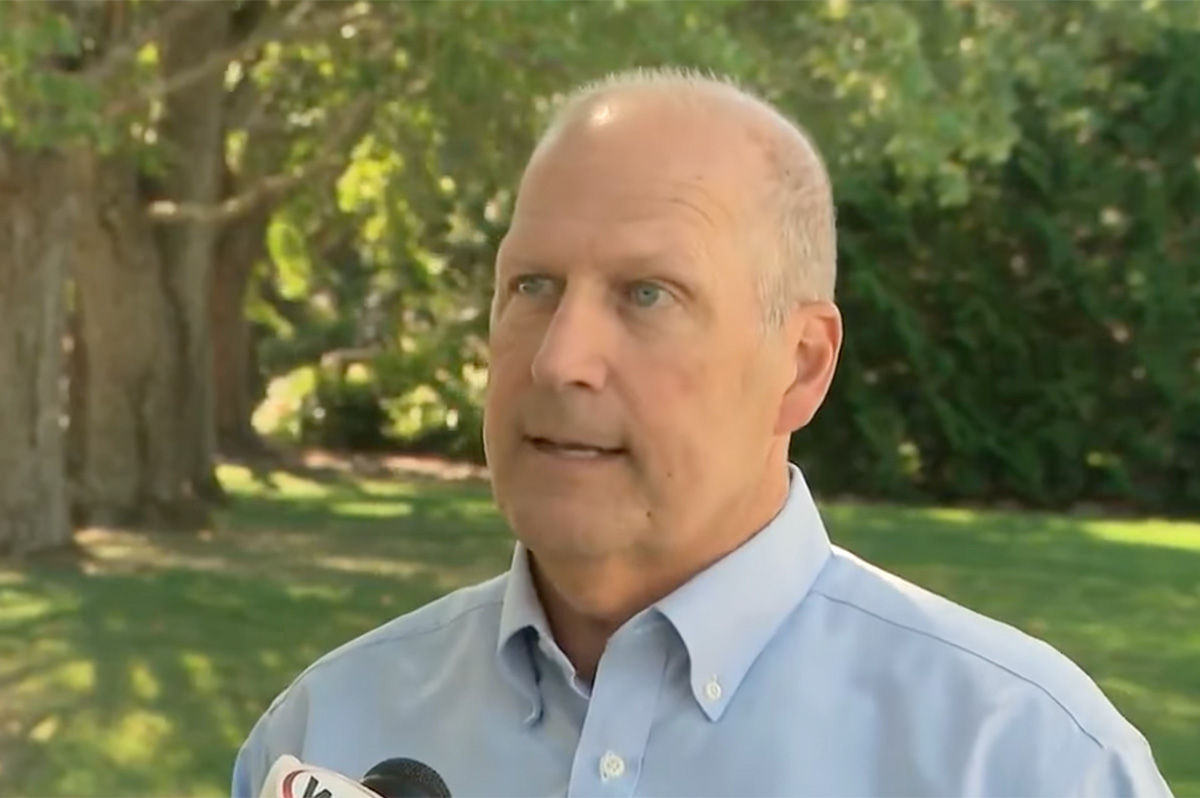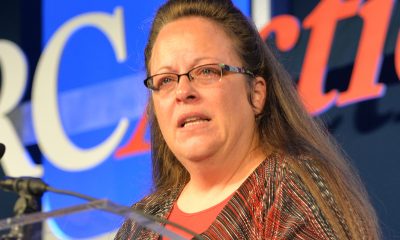Politics
OPM lays out post-DOMA plan for fed’l employee benefits
Health, pension, dental and life insurance benefits available immediately


U.S. Office of Personnel Management has instituted new guidance for married gay federal employees in the wake of the DOMA court ruling. (photo public domain)
Gay federal employees in legal same-sex marriages will be eligible immediately for health and pension benefits in the aftermath of the Supreme Court ruling against Section 3 of the Defense of Marriage Act, according to a new memo from the U.S. Office of Personnel Management.
The memorandum, dated June 28 and signed by OPM acting director Elaine Kaplan, identifies five new areas of benefits that will be available after the court decision for the legal spouses as well as newly qualified children and stepchildren of gay federal employees.
“There are numerous benefits that are affected by the Supreme Court’s decision, and it is impossible to answer every question that you might have,” Kaplan, a lesbian, writes. “Nevertheless, I want to assure you that the U.S. Office of Personnel Management is committed to working with the Department of Justice to ensure swift and seamless implementation of the court’s ruling.”
The five new benefits identified in the memo are:
• health insurance through the Federal Health Employees Benefits (FEHB) plan;
• life insurance through the Federal Employees’ Group Life Insurance (FEGLI) program;
• dental and vision insurance through the Federal Employee Dental and Vision Insurance Program (FEDVIP);
• long-term care insurance under the Federal Long Term Care Insurance Program (FLTCIP);
• retirement benefits;
• and the ability to submit claims for medical expenses through flexible spending accounts.
For each of the four insurance benefits in the memo, gay federal employees must elect to make a change within the window of 60 days between June 26, 2013 and August 26, 2013 to enroll. With respect to health, dental and vision insurance, the next opportunity would be at the start of open season later this year.
For employees who already have health coverage under a FEHB plan, coverage will begin immediately. For those who don’t, benefits will be effective on the first day of the first pay period after the enrollment request is received.
To be eligible for retirement benefits for their same-sex spouses, gay federal employees have two years until after the Supreme Court decision, or June 26, 2015, to inform OPM they have a legal marriage that qualifies for recognition and elect and changes to benefits.
The OPM memo is the first of many pieces of guidance expected from federal agencies in the wake of the Supreme Court’s decision to strike down the Defense of Marriage Act. After the court ruling, President Obama said he instructed U.S. Attorney Eric Holder to work with other Cabinet members to implement the end to the Defense of Marriage Act.
In a statement, Obama called the OPM guidance “a critical first step” toward implementing the Supreme Court ruling that determined “all married couples should be treated equally under federal law.”
“Thousands of gays and lesbians serve our country every day in the federal government,” Obama said. “They, and their spouses and children, deserve the same respect and protection as every other family.”
In another statement, Holder said the Obama administration by offering these benefits “is making real the promise of this important decision” against DOMA, but there’s more to come.
“As the President directed, the Department of Justice will continue to coordinate with other federal agencies to implement this ruling as swiftly and smoothly as possible,” Holder said. “I look forward to sharing additional information as it becomes available. We will never stop fighting to ensure equality, opportunity, and – above all – justice for everyone in this country.”
Leonard Hirsch, a board member for the LGBT federal employee affinity group known as Federal GLOBE, called the guidance “an extraordinary result” for everyone’s who been working on the issue for decades.
“It opens up the key benefits that key benefits for federal employees that have been closed — health insurance, life insurance — to the same-sex spouses of federal employees and retirees,” Hirsch said.
Hirsch also emphasized the word must to get out to federal retirees that their same-sex spouses are eligible for federal benefits in the wake of the ruling against DOMA.
“This was included, so this is a wonderful, inclusive set of changes that OPM has been preparing for and announced today,” Hirsch said.
Thomas Richards, an OPM spokesperson, confirmed that the guidance applies to all employees in legal same-sex marriages — even those that live in states that don’t recognize marriage equality.
“These benefits will be available to any federal employee or annuitant who has a valid marriage license, regardless of their state of residency,” Richards said.
But the guidance doesn’t cover federal employees in same-sex relationships who aren’t married, such as those in domestic partnerships or civil unions. In July, gay Rep. Mark Pocan (D-Wis.) is expected to introduce the legislation known as the Domestic Partnership Benefits & Obligations Act to address this issue.
Richards noted the limitations of the new guidance is restricted to legally married federal employees, but recalled a 2009 memorandum from President Obama that offered limited benefits to employees in civil unions or domestic partnerships
“Acting Director Kaplan’s memo identifies certain benefits previously available only to opposite-sex spouses that are now available to all legally married spouses, including same-sex spouses,” Richards said. “OPM has already extended benefits to same-sex domestic partners to the extent permissible under the law.”
Politics
Pro-trans candidates triumph despite millions in transphobic ads
Election results a potential blueprint for 2026 campaigns

Activists and political observers say the major Democratic victories on the East Coast last week prove anti-transgender attacks are no longer effective.
Democrats in Virginia, New Jersey, and New York who defended transgender rights directly — Abigail Spanberger, Mikie Sherrill, and Zohran Mamdani — won decisively, while Republicans who invested millions in anti-trans fearmongering were rejected by voters.
This contrasts sharply with the messaging coming out of the White House.
The Trump-Vance administration has pursued a hardline anti-trans agenda since taking office, from attempting to ban trans military members from serving to enforcing bathroom and sports bans. But this winning strategy may not be as solid for their voters as it once seemed.
The Washington Blade attended a post-election meeting hosted by the Human Rights Campaign, where LGBTQ advocates and political leaders reflected on the results and discussed how to build on the momentum heading into 2026 — as the Trump-Vance administration doubles down on its anti-trans agenda.
Among those on the call was U.S. Rep. Sarah McBride (D-Del.), the first openly trans person ever elected to Congress. Having run one of the nation’s most visible pro-trans campaigns, McBride said voters made their priorities clear.
“Voters made clear yesterday that they will reject campaigns built on hatred. They will reject campaigns that seek to divide us, and they will reject candidates that offer no solutions for the cost-of-living crisis this country is facing.”
McBride cited the Virginia governor’s race as a clear example of how a candidate can uplift trans people — specifically when their opponent is targeting kids — but also refocus the conversation on topics Americans truly care about: the economy, tariffs, mortgage rates, and the preservation of democracy.
“We saw millions of dollars in anti-trans attacks in Virginia, but we saw Governor-elect Spanberger respond. She defended her trans constituents, met voters with respect and grace, and ran a campaign that opened hearts and changed minds,” McBride said.
“That is the future of our politics. That is how we win — by combating misinformation, caricatures, fearmongering, and scapegoating.”
She added that the elections in Virginia, New Jersey, and New York offer a “blueprint” for how Democrats can effectively respond to GOP attacks and win “in the face of hatred.”
“When you dive into the data and you look in New Jersey, Virginia — you see the progress that pro-equality candidates have made in urban, suburban, and rural communities, among voters of every background and identity,” McBride said. “You see that we can compete everywhere … When we perform a politics that’s rooted in three concepts, we win.
“One is a politics of affordability — we prioritize the issues keeping voters up at night, the cost-of-living crisis. Two, we are curious, not judgmental — as candidates, we meet people where they are, hold true to our values, but extend grace so people can grow. And three, we root our politics in a sense of place.”
“All of these candidates were deeply committed to their districts, to their state, to their city,” she continued. “Voters responded because they were able to see a politics that transcended partisanship and ideology … about building community with one another, across our disagreements and our differences. When we as pro-equality candidates embody that type of politics — a politics of affordability, curiosity, and community — we win.”
Human Rights Campaign President Kelley Robinson echoed McBride’s sentiment — once again moving away from the bogeyman Republicans have made trans children out to be and refocusing on politics that matter to people’s everyday lives.
“Anti-trans extremists poured millions into fearmongering, hoping cruelty could substitute for leadership — and once again, it failed,” Robinson said. “Fear can’t fill a prescription. Division doesn’t lower rent or put food on the table. Voters saw through the distraction.”
Robinson then detailed how much money Virginia Lt. Gov. Winsome Earle-Sears, the Republican who challenged Spanberger, spent on these ads — showing that even with money and a PAC standing behind her (like the Republican Governors Association’s Right Direction PAC, which gave her $9.5 million), success isn’t possible without a message that connects with constituents.
“In Virginia, Abigail Spanberger made history defeating Winsome Earle-Sears and more than $9 million of anti-trans attack ads. She didn’t flinch. She didn’t hide from her values. She led with them — and Virginians rewarded that courage.”
Equality Virginia Executive Director Narissa Rahaman went into further detail on how the Republican nominee for Virginia’s governor leaned into transphobia.
“Winsome Earle-Sears spent more than 60 percent of her paid media budget attacking transgender kids — an unprecedented amount — and it failed.”
Rahaman continued, saying the results send a message to the whole country, noting that only 3 percent of voters ranked trans issues as a top concern by the end of October.
“Virginia voters sent a resounding message that anti-trans fearmongering is not a winning strategy — not here in Virginia, and not anywhere else,” Rahaman said. “Candidates who met these attacks head-on with messages rooted in freedom, safety, and fairness saw overwhelming success. Attacking transgender youth is not a path to power. It is a moral dead end — and a political one too.”
Virginia state Del. Joshua Cole (D-Fredericksburg), who was also on the call, put it bluntly:
“Republicans have now become champions of campaigning on bullying kids — and we saw last night that that was a losing tactic.”
“Virginians came out en masse to say we believe in protecting our neighbors, protecting our friends — and standing up for everybody.”
That message rang true well beyond Virginia.
In New Jersey, Rep. Mikie Sherrill pushed back against GOP efforts to weaponize trans issues, telling voters, “When you really talk to people, they have empathy. They understand these are kids, these are families, and they deserve our support.”
And in New York, state Assemblymember Zohran Mamdani released a pre-election ad honoring trans liberation icon Sylvia Rivera, declaring, “New York will not sit idly by while trans people are attacked.”

Former Vice President Dick Cheney died of complications from pneumonia and cardio and vascular disease, according to a family statement released Tuesday morning. He was 84.
Cheney served as vice president under President George W. Bush for eight years and previously as defense secretary under President George H.W. Bush. He also served as a House member from Wyoming and as White House chief of staff for President Gerald Ford.
“Dick Cheney was a great and good man who taught his children and grandchildren to love our country, and to live lives of courage, honor, love, kindness, and fly fishing,” his family said in a statement. “We are grateful beyond measure for all Dick Cheney did for our country. And we are blessed beyond measure to have loved and been loved by this noble giant of a man.”
Cheney had a complicated history on LGBTQ issues; he and wife Lynne had two daughters, Liz Cheney and Mary Cheney, who’s a lesbian. Mary Cheney was criticized by LGBTQ advocates for not joining the fight against President George W. Bush’s push for a constitutional amendment banning gay marriage. She later resumed support for LGBTQ issues in 2009, including same-sex marriage, after her father left office in 2009. She married her partner since 1992, Heather Poe, in 2012.
In 2010, after leaving office, Cheney predicted “Don’t Ask, Don’t Tell” would “be changed” and expressed support for reconsideration of the law banning open military service.
In 2013, the Cheney family’s disagreements over marriage equality spilled into the public eye after Liz Cheney announced her opposition to same-sex couples legally marrying. Mary Cheney took to Facebook to rebuke her sister: “Liz – this isn’t just an issue on which we disagree – you’re just wrong – and on the wrong side of history.” Dick and Lynne Cheney were supporters of marriage equality by 2013. Liz Cheney eventually came around years later.
Cheney, a neo-con, was often criticized for his handling of the Iraq war. He was considered one of the most powerful and domineering vice presidents of the modern era. He disappeared from public life for years but re-emerged to help Liz Cheney in her House re-election bid after she clashed with President Trump. Dick Cheney assailed Trump in a campaign video and later Liz announced that her father would vote for Kamala Harris in the 2024 presidential election.
New Hampshire
John E. Sununu to run for NH Senate seat
Gay Congressman Chris Pappas among other candidates

Former U.S. Sen. John E. Sununu on Wednesday announced he is running for retiring U.S. Sen. Jeanne Shaheen (D-N.H.)’s seat in 2026.
“Washington, as anyone who observes can see, is a little dysfunctional right now,” Sununu told WMUR in an interview the New Hampshire television station aired on Wednesday. “There’s yelling, there’s inactivity. We’ve got a government shutdown. Friends, family, they always say, ‘Why would anyone want to work there?’ And the short answer is it’s important to New Hampshire. It’s important that we have someone who knows how to get things done.”
Sununu, 61, was in the U.S. House of Representatives from 1997-2003 and in the U.S. Senate from 2003-2009. Shaheen in 2008 defeated Sununu when he ran for re-election.
Sununu’s father is John Sununu, who was former President George H.W. Bush’s chief of staff. Sununu’s brother is former New Hampshire Gov. Chris Sununu.
John E. Sununu will square off against former U.S. Sen. Scott Brown in the Republican primary. Gay U.S. Rep. Chris Pappas (D-N.H.) is among the Democrats running for Shaheen’s seat.
“As a small business owner and public servant, I’m in this fight to put people first and do what’s right for New Hampshire,” said Pappas on Wednesday on X. “I’m working to lower costs and build a fair economy. Washington should work for you — not corporate interests.”
-

 U.S. Supreme Court3 days ago
U.S. Supreme Court3 days agoSupreme Court rejects Kim Davis’s effort to overturn landmark marriage ruling
-

 District of Columbia3 days ago
District of Columbia3 days agoCapital Pride files anti-stalking complaint against local LGBTQ activist
-

 Politics11 hours ago
Politics11 hours agoPro-trans candidates triumph despite millions in transphobic ads
-

 Dining3 days ago
Dining3 days agoSpark Social House to start serving alcohol

















